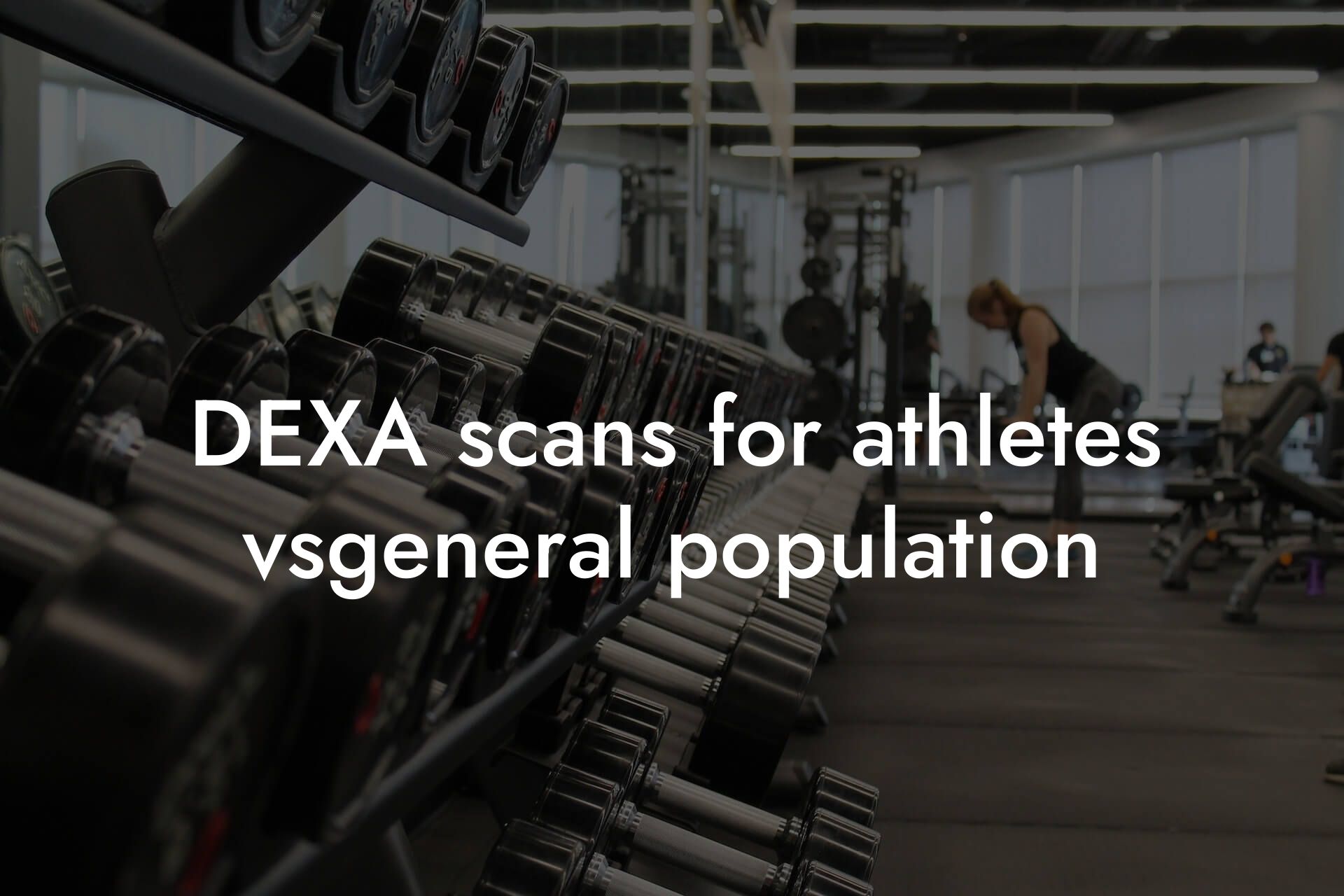What is a DEXA Scan?
A DEXA (Dual-Energy X-ray Absorptiometry) scan is a non-invasive medical test that measures bone density, body composition, and fat mass. It's a valuable tool for individuals looking to track their progress, identify areas for improvement, and optimize their physical performance. At Tano Performance Group, we use state-of-the-art DEXA technology to provide our clients with a comprehensive body assessment, empowering them to take their fitness journey to the next level.
Table of Contents
Why is Preparation Important?
Proper preparation is crucial to ensure accurate and reliable results from your DEXA scan. Failing to prepare adequately can lead to inaccurate readings, which may hinder your ability to make informed decisions about your fitness and nutrition plan. By following the guidelines outlined in this article, you'll be able to get the most out of your DEXA scan and gain a deeper understanding of your body.
What to Expect During the Scan
The DEXA scan process is quick, easy, and painless. You'll lie down on a comfortable examination table, and the scanner will pass over your body, emitting low-level X-rays. The entire process typically takes around 10-15 minutes, depending on the type of scan and the specific areas being measured. During the scan, you'll be asked to remain still and hold your breath for a few seconds to ensure accurate readings.
Pre-Scan Preparation: Clothing and Accessories
To ensure accurate results, it's essential to wear clothing and accessories that won't interfere with the scan. Please avoid wearing:
- Metallic objects, such as jewelry, glasses, or clothing with metal fasteners
- Clothing with high-density materials, like lead or copper
- Anything with metal threads or wire, including underwire bras
- Shoes or clothing with metal buckles or zippers
Instead, opt for comfortable, loose-fitting clothing made from natural fibers like cotton or linen. Remove any jewelry, glasses, or metal objects before the scan, and avoid wearing anything that may contain metal or high-density materials.
Dietary Preparations
Your diet can impact the accuracy of your DEXA scan results. To ensure the most accurate readings, follow these dietary guidelines:
- Avoid consuming calcium supplements or calcium-rich foods for at least 24 hours before the scan
- Limit your intake of foods high in fiber, such as beans, broccoli, or cabbage, for 24 hours prior to the scan
- Refrain from eating or drinking anything for at least 2 hours before the scan, except for water
Additionally, try to maintain a consistent diet and hydration level in the days leading up to your scan. This will help ensure that your body composition and bone density readings are accurate and representative of your typical state.
Hydration and Medications
Proper hydration is essential for accurate DEXA scan results. Make sure to drink plenty of water in the days leading up to your scan, and avoid excessive caffeine or diuretics, which can affect your hydration levels.
If you're taking any medications, inform your healthcare provider or the DEXA scan technician. Certain medications, such as osteoporosis treatments or hormone replacement therapy, may affect your bone density readings.
Physical Activity and Sleep
Try to maintain your regular physical activity routine in the days leading up to your DEXA scan. Avoid any strenuous exercise or activities that may cause muscle soreness or inflammation, as this can affect your body composition readings.
Aim to get a good night's sleep before your scan, as fatigue can impact your body's hydration levels and overall physiology. Aim for 7-9 hours of sleep to ensure you're well-rested and ready for your scan.
What to Expect After the Scan
After your DEXA scan, you'll receive a comprehensive report outlining your body composition, bone density, and fat mass. Our team of experts will review the results with you, providing personalized recommendations and guidance to help you achieve your fitness goals.
Use your DEXA scan results as a baseline to track your progress over time. By making adjustments to your diet, exercise routine, and lifestyle, you can optimize your body composition, improve your overall health, and achieve the physique you desire.
Preparing for your DEXA scan is a crucial step in ensuring accurate and reliable results. By following the guidelines outlined in this article, you'll be able to get the most out of your scan and gain a deeper understanding of your body. Remember to stay hydrated, avoid certain foods and medications, and maintain a consistent diet and exercise routine. With proper preparation and a comprehensive understanding of your body, you'll be empowered to make informed decisions and take your fitness journey to the next level.
Frequently Asked Questions
What is a DEXA scan?
A DEXA (Dual-Energy X-ray Absorptiometry) scan is a non-invasive medical test that measures bone density and body composition, including fat mass and lean mass. It's commonly used to diagnose osteoporosis, monitor bone loss, and track changes in body composition over time.
Why do I need a DEXA scan?
You may need a DEXA scan if you're at risk for osteoporosis, have a family history of the condition, or are experiencing symptoms such as back pain or height loss. Additionally, athletes and individuals who want to monitor their body composition for performance or aesthetic purposes may also benefit from a DEXA scan.
How does a DEXA scan work?
During a DEXA scan, you'll lie on an examination table, and a scanner will pass over your body, emitting low-level X-rays. The scanner measures the absorption of these X-rays by your bones and soft tissues, providing a detailed picture of your bone density and body composition.
Is a DEXA scan safe?
Yes, DEXA scans are extremely safe and use very low levels of radiation, equivalent to a few days of natural background radiation. They're also quick, taking around 10-15 minutes to complete.
How do I prepare for a DEXA scan?
To prepare for a DEXA scan, avoid eating or drinking anything that contains calcium, such as milk or antacids, for at least 24 hours before the test. Wear loose, comfortable clothing and avoid wearing metal objects, such as jewelry or glasses, that may interfere with the scan.
What should I wear to a DEXA scan?
Wear loose, comfortable clothing that doesn't contain metal, such as cotton or athletic wear. Avoid wearing dresses, skirts, or tight-fitting clothing that may interfere with the scan.
Can I wear jewelry during a DEXA scan?
No, it's best to remove all jewelry, including piercings, before the scan, as metal objects can interfere with the results.
Can I eat before a DEXA scan?
Avoid eating or drinking anything that contains calcium, such as milk or antacids, for at least 24 hours before the test. You can eat a light meal or snack otherwise, but avoid anything too heavy or greasy.
How long does a DEXA scan take?
A DEXA scan typically takes around 10-15 minutes to complete, although this may vary depending on the specific type of scan and the individual's needs.
Will I feel anything during the scan?
No, you won't feel anything during the scan, as it's a non-invasive and painless procedure.
What happens after the scan?
After the scan, a healthcare professional will analyze the results and provide you with a detailed report, which may include recommendations for improving your bone density or body composition.
How often should I get a DEXA scan?
The frequency of DEXA scans depends on your individual needs and health status. Typically, scans are recommended every 1-2 years for individuals at risk of osteoporosis, and every 6-12 months for athletes or individuals monitoring their body composition.
What does the scan measure?
A DEXA scan measures bone density, fat mass, lean mass, and percentage body fat. It also provides information on visceral fat, which is fat that accumulates around the organs in the abdominal cavity.
What is the difference between bone density and bone mass?
Bone density refers to the amount of mineral content in your bones, while bone mass refers to the overall amount of bone tissue. A DEXA scan measures both bone density and bone mass.
What is T-score and Z-score?
The T-score compares your bone density to that of a healthy 30-year-old adult, while the Z-score compares your bone density to that of others of the same age, sex, and ethnicity. These scores help healthcare professionals diagnose and monitor osteoporosis.
What is body composition analysis?
Body composition analysis is the measurement of the percentage of fat and lean mass in your body. This information can help you track changes in your physique, monitor progress towards fitness goals, and identify potential health risks.
How accurate is a DEXA scan?
DEXA scans are highly accurate, with a precision error of around 1-2%. However, results may vary depending on the individual's hydration level, body position, and other factors.
Can I get a DEXA scan if I'm pregnant or breastfeeding?
It's generally not recommended to get a DEXA scan during pregnancy or breastfeeding, as the radiation exposure, although low, may pose a risk to the fetus or baby. However, your healthcare provider may recommend a scan in certain circumstances.
Can children get a DEXA scan?
Yes, children can get a DEXA scan, although the procedure and results may vary depending on their age and developmental stage.
How much does a DEXA scan cost?
The cost of a DEXA scan varies depending on the location, provider, and individual's insurance coverage. On average, the cost ranges from $100 to $300.
Is a DEXA scan covered by insurance?
Insurance coverage for DEXA scans varies depending on the individual's policy and provider. Some insurance plans may cover the scan as part of a routine health exam, while others may require a copayment or deductible.
What if I have a metal implant or pacemaker?
If you have a metal implant or pacemaker, inform your healthcare provider before the scan. In some cases, the scan may not be recommended or may require special precautions.
Can I get a DEXA scan if I'm claustrophobic?
If you're claustrophobic, inform your healthcare provider before the scan. In some cases, the scan may be adapted to accommodate your needs, or alternative procedures may be recommended.
Here are some related articles you might love...
- How often should you get a DEXA scan?
- Benefits of DEXA scans for professionals
- DEXA scans for athletes vs general population
- What is a DEXA scan?
- Understanding DEXA scan results
- How DEXA scans measure body fat
- DEXA scan vs other body composition tests (e.g., BMI, calipers)
- Cost of a DEXA scan: Is it worth it?
- Accuracy of DEXA scans
Zak Faulkner
Zak Faulkner is a leading authority in the realm of physical health and body composition analysis, with over 15 years of experience helping professionals optimise their fitness and well-being. As one the experts behind Tano Performance Group, Zak has dedicated his career to providing in-depth, science-backed insights that empower clients to elevate their physical performance and overall health.
With extensive knowledge of DEXA technology, Zak specializes in delivering comprehensive body assessments that offer precise data on body fat, muscle mass, bone density, and overall physique. His expertise enables individuals to make informed decisions and achieve their fitness goals with accuracy and confidence. Zak’s approach is rooted in a deep understanding of human physiology, combined with a passion for helping clients unlock their full potential through personalised strategies.
Over the years, Zak has earned a reputation for his commitment to excellence, precision, and client-focused service. His guidance is trusted by top professionals who demand the best when it comes to their health. Whether advising on fitness programs, nutritional strategies, or long-term wellness plans, Zak Faulkner’s insights are a valuable resource for anyone serious about taking their health and fitness to the next level.
At Tano Performance Group, Zak continues to lead our Content Team revolutionising how professionals approach their physical health, offering unparalleled expertise that drives real results.




